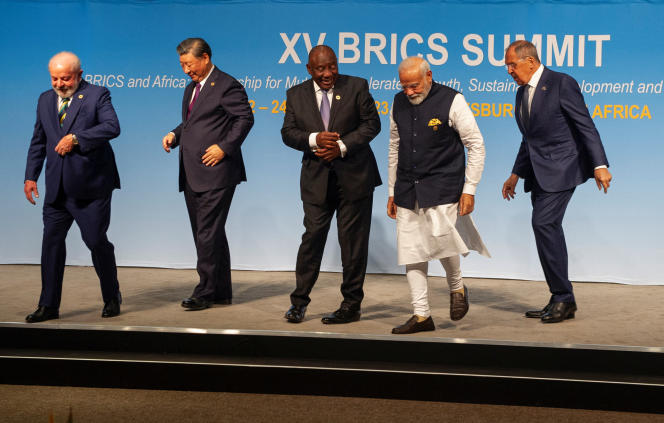In Beijing’s grand plan to develop the use of the yuan (renminbi, its official name) internationally, this is an additional step. The welcoming of six new countries (Saudi Arabia, Argentina, Egypt, United Arab Emirates, Ethiopia, Iran) within the BRICS (Brazil, Russia, India, China, South Africa), recorded on August 24 in Johannesburg, will constitute a new economic bloc eager to reduce its dependence on the dollar. And for which the Chinese currency is likely to embody an alternative. Satisfied, Chinese President Xi Jinping hailed “a historic enlargement”, without explicitly mentioning this objective.
It is however clear: since the start of the war in Ukraine, Beijing has intensified initiatives to deploy its currency outside its borders. It now buys Russian hydrocarbons in renminbis and is developing its own cross-border interbank payment system, the China International Payment System (CIPS). It multiplies the agreements of exchanges of currencies (“swaps”) with the foreign central banks, and, since June, the actions of Chinese groups can be traded in yuan on the Stock Exchange of Hong Kong.
“The share of the renminbi is still weak”
“ This activism is not new, China has long sought to make the yuan an international currency., recalls Philippe Aguignier, associate researcher at the Institut Montaigne and professor of Chinese economics at the National Institute of Oriental Languages and Civilizations. Since 2005, it has slowly loosened control over its currency – sometimes with reversals – which remains partially convertible, unlike the euro or the dollar. In 2010, it authorized its companies to pay for their imports and exports in renminbis – and no longer in dollars –, then made Hong Kong the first offshore center of its currency, from where the supply of yuan abroad is managed.
“These efforts are all the more intense as China worries about American sanctions imposed on Iran or Russia, and seeks to immunize itself from them”, adds Philippe Aguignier. In the event that tensions around Taiwan rise a notch, Beijing would also expose itself to sanctions from Washington. “It is likely that China is trying to form the beginnings of an alternative network that allows to escape the American capacity to impose retaliation with global reach”abounds Philippe Dauba-Pantanacce, director of economic and geopolitical research at the Standard Chartered bank.
You have 48.27% of this article left to read. The following is for subscribers only.
